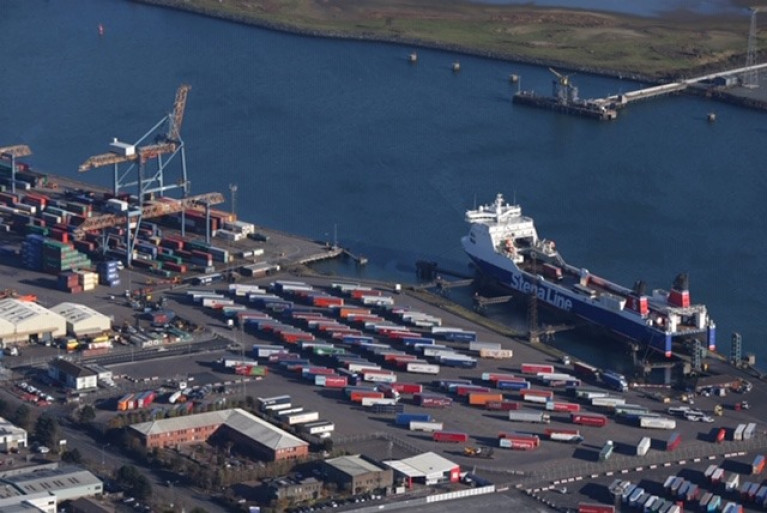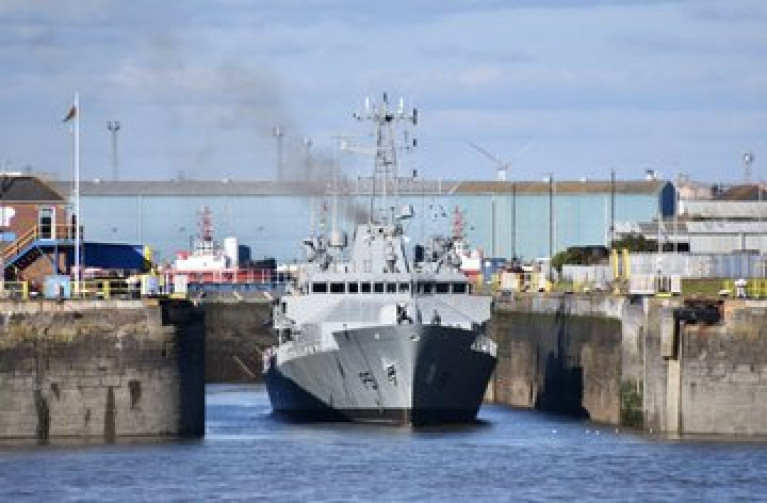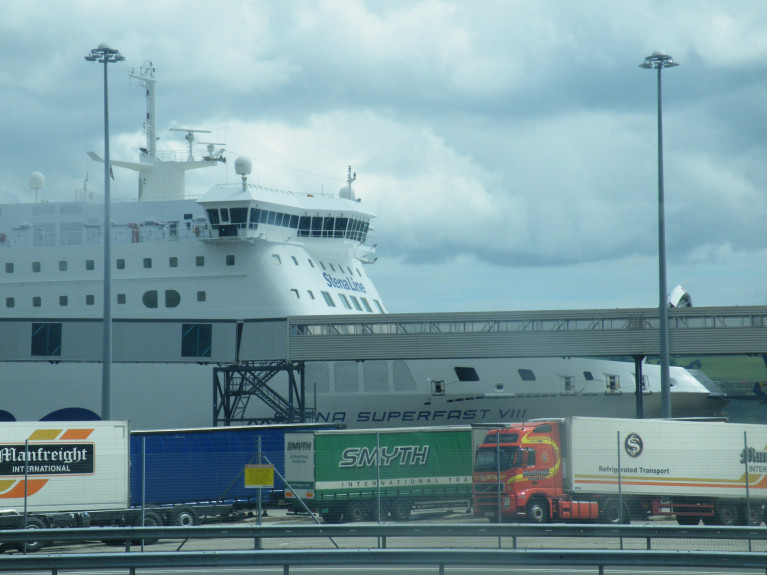Displaying items by tag: NI protocol
Northern Ireland Protocol: Blamed By Freight Groups for Making it Harder for Irish Sea Ferry in Storm Isha to Head for Port
Blame has been put directly to the Northern Ireland Protocol for narrowing down the options of captains, as vessels get hit by storms in the Irish Sea.
With Storm Isha just over, the News Letter also reported the the severe weather was a notch away from been of ‘Hurricane’ force conditions.
A passenger/freight ro-ro ferry Stena Estrid during Storm Isha as Afloat reported sailing from Birkenhead (Liverpool), spent about 10-11 hours doing circuits in the sea, which took place off the mouth of Belfast Lough.
The E-Flexer class ferry had departed Birkenhead in the morning, was still at sea overnight off the Ulster coast amid the seriously rough conditions created by Storm Isha.
The entire crossing from Merseyside to the Lagan was meant to take only around an eight-hour passage, but the ferry left port at 10.30am on Sunday and did not berth until 4.30am on Monday.
John Martin of the Road Haulage Association, which represents the interests of freight firms, told the News Letter that Storm Isha will have cost shippers dearly.
In addition under the current post-Brexit arrangements, this makes it much harder for freight-vessels bound for the North, to instead then having to divert to ports in the Republic.
More here on this story.
British Government to Bring Forward Legislation on Completing Border Control Posts at NI Ports
Legislation is to be brought forward by the British Government this week, RTÉ News understands which could see work resume in Northern Ireland ports with the construction of border control posts.
The delay to works in the ports follows months of controversy relating to the Northern Ireland Protocol.
Following implementaton of the leglisation, this will allow Officials in Whitehall to expedite completion of infrastructure for the purpose of agrifood checks carried out at ports. The transfer of port infrastructure to Whitehall comes despite the issue been a devolved matter in which the Northern Ireland civil service would otherwise handle.
RTÉ News also understands that Officials from the British Government have informed the European Commission that such legislation reflected the absence of a functioning Northern Ireland executive.
Under the terms of the Northern Ireland Protocol, the so-called border control posts or points of entry, were supposed to be constructed at ports and also operated by officials from the Northern Ireland's (DAERA) Department of Agriculture, Environment and Rural Affairs.
DAERA which is part of the Northern Ireland Executive, were to be held responsible for carrying out EU animal health checks in addition to those concerning food safety on agrifood products entering ports in Northern Ireland from Great Britain.
Further coverage from RTE News here.
The Minister for Foreign Affairs Simon Coveney has told Britain's Foreign Secretary that proposed legislation to change to Northern Ireland Protocol will create a whole new set of uncertainties and damage relationships.
The British government is due to publish details of proposed legislation to give ministers the power to override parts of the protocol.
The Irish Government and European Union have warned against unilateral action and urged a return to the negotiating table, but those pleas are set to be ignored.
Mr Coveney said it marks a particular low point in the UK’s approach to Brexit.
He spoke to Ms Truss by phone this morning, where she outlined her intention to publish the legislation today.
Mr Coveney said publishing legislation that would breach the UK's commitments under international law, the Brexit Withdrawal Agreement and Northern Ireland Protocol is deeply damaging to relationships on these islands and between the UK and EU.
For more RTE News reports.
Taoiseach Says Post-Brexit Row Must be Resolved, as British-Irish Council to Meet in Wales
An Taoiseach Micheál Martin has said the UK and European Union need to “knuckle down” and resolve the dispute over Northern Ireland’s post-Brexit arrangements, as a meeting of the British-Irish Council is set to take place in Wales today.
As The Irish Times writes, the meeting of politicians from across Ireland and the UK comes amid ongoing negotiations between London and Brussels about post-Brexit trading arrangements in Northern Ireland, and is expected to include discussions on the Northern Ireland protocol.
UK Brexit minister David Frost will hold further talks with European Commission vice-president Maros Sefcovic on Friday, with the UK still warning that it could unilaterally suspend parts of the Northern Ireland deal unless major changes are made.
But Mr Martin said he was encouraged that progress is being made and the “mood music” has changed. In a BBC interview, Mr Martin cautioned the UK against taking the step of triggering article 16 of the Northern Ireland protocol, which would suspend parts of the arrangements.
The protocol was put in place to prevent a hard border on the island of Ireland by effectively keeping Northern Ireland in the EU’s single market for goods, but that meant checks on products crossing the Irish Sea from Britain.
More here on the politcal developments.
NI Protocol: EU Negotiators to Travel to London for Talks
As RTE News reports, talks are set to continue between the UK and the EU as it was warned the two sides were still far apart on issues surrounding the Northern Ireland Protocol.
UK officials described as "constructive" the first round of talks in Brussels this week, which came after the EU proposed new measures earlier this month.
It is understood that while there was common ground in some areas, there were still substantial gaps on what were seen as fundamental issues mainly surrounding governance.
Sources close to the negotiations said "real progress" must be made soon and a process of "endless negotiation" must be avoided. But reports of Christmas crackers being delayed by the Protocol was "yet another practical example" of the disruption caused by the agreement.
A team from the European Commission is set to travel to London on Tuesday for several days of intensive discussions.
More on this story here.


























































